
Hurricanes are tropical storms that form cyclones over the warm waters of the ocean. These circular weather phenomena are classified by the Saffir-Simpson
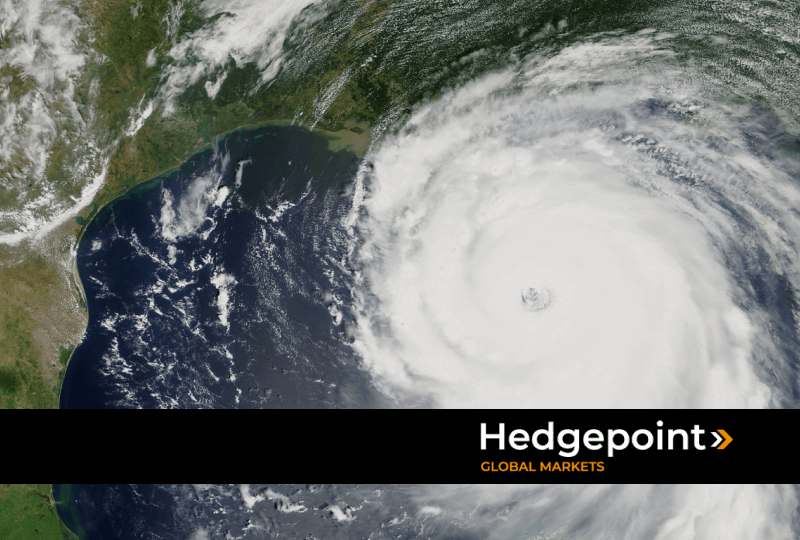
Hurricanes are tropical storms that form cyclones over the warm waters of the ocean. These circular weather phenomena are classified by the Saffir-Simpson scale, ranging from 1 to 5. Category 1 hurricanes can reach wind speeds between 74-95 mph (119-153 km/h), while the most intense (categories 3-5) can exceed 157 mph (252 km/h).
With such powerful winds and rain, hurricanes can cause extensive damage to entire cities in America, putting pressure on the national economy. Additionally, the hurricane season significantly impacts the country’s energy sector, which has many oil refineries located in high-risk areas.
 Victor Arduin, Energy and Macroeconomics Analyst at Hedgepoint, discussed the main impacts of this season on the American oil market and its influence on the global market. Enjoy the read!
Victor Arduin, Energy and Macroeconomics Analyst at Hedgepoint, discussed the main impacts of this season on the American oil market and its influence on the global market. Enjoy the read!
The Hurricane Season in America
The Atlantic hurricane season starts on June 1st and lasts until November 30th. Historically, the peak of activity in the ocean is around September 10th, but there are other intense occurrences between mid-August and mid-October. The National Oceanic and Atmospheric Administration (NOAA) has published a graph showing the historical data from the last 100 years:
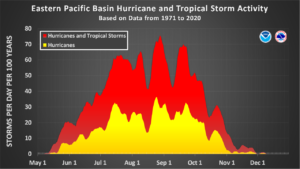
Source: NOAA
Various regions of the United States suffer from the intense winds and rains caused by hurricanes. The most affected areas are the Atlantic and Gulf of Mexico coastlines, Puerto Rico, the Virgin Islands, Hawaii, and parts of the southwestern United States.
For 2024, NOAA predicts a more intense hurricane season with an 85% chance of being above normal. The La Niña phenomenon and high ocean temperatures are the main factors that could intensify this climatic event. The agency expects 4 to 7 major hurricanes this year. The first alert was issued on June 17th, and its potential impact could be greater in the southern United States.
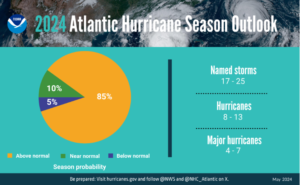
Source: NOAA
In economic terms, the hurricane season also has its impact. Hurricane Katrina was recorded as the most financially devastating. The Insurance Information Institute quantified the losses caused by the 10 largest American hurricanes through insurance claims. Check out their report:
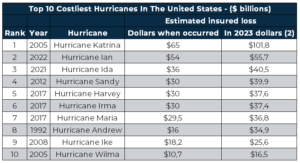
You can also follow an interactive NOAA map to view and analyze historical information about the largest hurricanes ever recorded in the Atlantic. The National Hurricane Center also provides a table quantifying event since 1851.
Read also:
The high likelihood of an intense hurricane season help has raised concerns in the U.S. energy production sector. According to the U.S. Energy Information Administration (EIA), most of the country’s offshore refineries produce oil and natural gas.
Located in areas with higher hurricane incidence, these refineries are subject to the intense rains and winds caused by these phenomena. According to Victor Arduin, the oil market primarily suffers because production is interrupted during severe weather events.
“We see the interruption of oil and refined product production for safety reasons. These stoppages can cause significant fluctuations in prices and supply within and outside the U.S.,” says Arduin.
According to the EIA, GOM crude oil production accounted for 14% of the U.S. total in 2023. Meanwhile, Gulf Coast refineries represent nearly 50% of the U.S. production capacity.
The institution recently published a graph highlighting the reduction in oil production due to hurricanes. The periods of production stoppage are short but significant. See below:
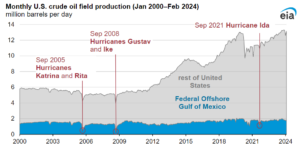
Source: EIA
“When refineries stop producing, we see increased pressure on gasoline and diesel prices. Such supply shocks directly impact future energy market contracts,” says Arduin.
Read also:
According to Arduin, production interruptions have significant effects on both the American and global oil markets. With lower inventory levels, fuel prices rise in the country and subsequently reflect globally.
Furthermore, the professional explains that American oil exports also decline during severe climatic events. Victor notes that importing countries must seek supply from other nations, often paying more or spending more on new logistics.
“Another country won’t be able to buy oil from the U.S. due to the sudden low supply. Therefore, they need to look for other exporters, even if it costs more. This is the global effect of hurricanes, which quickly drives up prices,” concludes Arduin.
The pressure on oil prices increases with the hurricane season, and the market needs to adapt to price conditions. Last year, the IEA estimated a 25 to 30 cent increase per gallon of gasoline in cases of high-impact hurricanes. Using data from 2013-2022, the institution created a table representing the potential reduction in oil production in 2023 if there were intense climatic events.
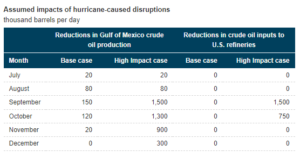
How the Market Prepares for the Atlantic Hurricane Season
As highlighted by the Hedgepoint specialist, fuel prices tend to fluctuate during hurricane seasons. An abrupt halt in U.S. production directly affects supply in both national and international markets.
To manage the financial risks arising from these events, the market uses advanced hedging tools. These products aim to mitigate price variables and minimize potential business impacts.
“During the hurricane season, it is possible to implement hedging strategies to manage financial risks and control price fluctuations,” says Victor.
In such a volatile market, it is essential to have a professional hedging partner with extensive knowledge of the energy sector. Contact Hedgepoint to learn more about these tools that can benefit your business.

Rua Funchal, 418, 18º andar - Vila Olímpia São Paulo, SP, Brasil
Contato
(00) 99999-8888 example@mail.com
Section
Home
O que Fazemos
Mercado
Quem Somos
HUB
Blog
Esta página foi preparada pela Hedgepoint Schweiz AG e suas afiliadas (“Hedgepoint”) exclusivamente para fins informativos e instrutivos, sem o objetivo de estabelecer obrigações ou compromissos com terceiros, nem de promover uma oferta ou solicitação de oferta de venda ou compra de quaisquer valores mobiliários, commodity interests ou produtos de investimento.
A Hedgepoint e suas associadas renunciam expressamente a qualquer uso das informações contidas neste documento que direta ou indiretamente resulte em danos ou prejuízos de qualquer natureza. As informações são obtidas de fontes que acreditamos serem confiáveis, mas não garantimos a atualidade ou precisão dessas informações.
O trading de commodity interests, como futuros, opções e swaps, envolve um risco substancial de perda e pode não ser adequado para todos os investidores. Você deve considerar cuidadosamente se esse tipo de negociação é adequado para você, levando em conta sua situação financeira. O desempenho passado não é necessariamente indicativo de resultados futuros. Os clientes devem confiar em seu próprio julgamento independente e/ou consultores antes de realizar qualquer transação.
A Hedgepoint não fornece consultoria jurídica, tributária ou contábil, sendo de sua responsabilidade buscar essas orientações separadamente.
A Hedgepoint Schweiz AG está organizada, constituída e existente sob as leis da Suíça, é afiliada à ARIF, a Associação Romande des Intermédiaires Financiers, que é uma Organização de Autorregulação autorizada pela FINMA. A Hedgepoint Commodities LLC está organizada, constituída e existente sob as leis dos Estados Unidos, sendo autorizada e regulada pela Commodity Futures Trading Commission (CFTC) e é membro da National Futures Association (NFA), atuando como Introducing Broker e Commodity Trading Advisor. A Hedgepoint Global Markets Limited é regulada pela Dubai Financial Services Authority. O conteúdo é direcionado a Clientes Profissionais e não a Clientes de Varejo. A Hedgepoint Global Markets PTE. Ltd está organizada, constituída e existente sob as leis de Singapura, isenta de obter uma licença de serviços financeiros conforme o Segundo Anexo do Securities and Futures (Licensing and Conduct of Business) Act, pela Monetary Authority of Singapore (MAS). A Hedgepoint Global Markets DTVM Ltda. é autorizada e regulada no Brasil pelo Banco Central do Brasil (BCB) e pela Comissão de Valores Mobiliários (CVM). A Hedgepoint Serviços Ltda. está organizada, constituída e existente sob as leis do Brasil. A Hedgepoint Global Markets S.A. está organizada, constituída e existente sob as leis do Uruguai.
Em caso de dúvidas não resolvidas no primeiro contato com o atendimento ao cliente (client.services@hedgepointglobal.com), entre em contato com o canal de ouvidoria interna (ombudsman@hedgepointglobal.com – global ou ouvidoria@hedgepointglobal.com – apenas Brasil) ou ligue para 0800-8788408 (apenas Brasil).
Integridade, ética e transparência são valores que guiam nossa cultura. Para fortalecer ainda mais nossas práticas, a Hedgepoint possui um canal de denúncias para colaboradores e terceiros via e-mail ethicline@hedgepointglobal.com ou pelo formulário Ethic Line – Hedgepoint Global Markets.
Nota de segurança: Todos os contatos com clientes e parceiros são realizados exclusivamente por meio do nosso domínio @hedgepointglobal.com. Não aceite informações, boletos, extratos ou solicitações de outros domínios e preste atenção especial a variações em letras ou grafias, pois podem indicar uma situação fraudulenta.
“Hedgepoint” e o logotipo “Hedgepoint” são marcas de uso exclusivo da Hedgepoint e/ou de suas afiliadas. O uso ou reprodução é proibido, a menos que expressamente autorizado pela HedgePoint.
Além disso, o uso de outras marcas neste documento foi autorizado apenas para fins de identificação. Isso, portanto, não implica quaisquer direitos da HedgePoint sobre essas marcas ou implica endosso, associação ou aprovação pelos proprietários dessas marcas com a Hedgepoint ou suas afiliadas.
aA Hedgepoint Global Markets é correspondente cambial do Ebury Banco de Câmbio, de acordo com a resolução CMN Nº 4.935, DE 29 DE JULHO DE 2021, Artigo 14 do Banco Central do Brasil (BACEN).
Para mais informações sobre nosso parceiro, serviços disponíveis, atendimento e ouvidoria, acesse o link a seguir: https://br.ebury.com/